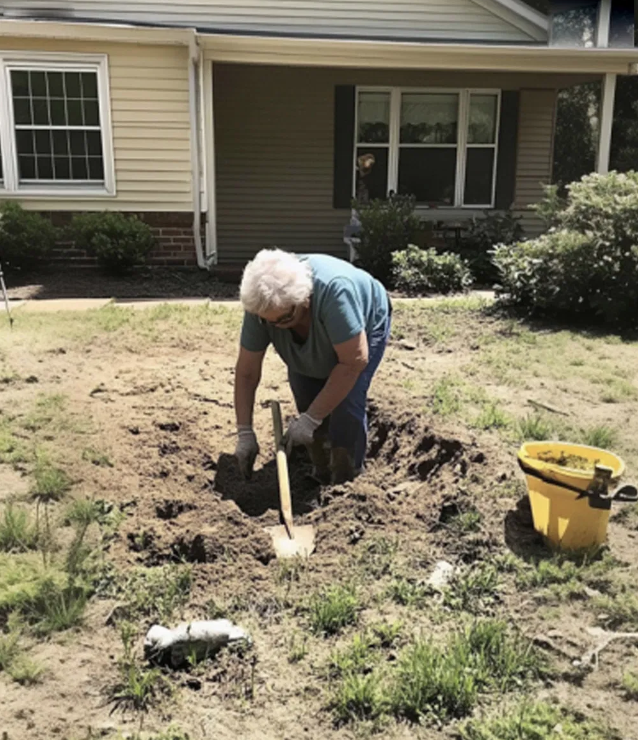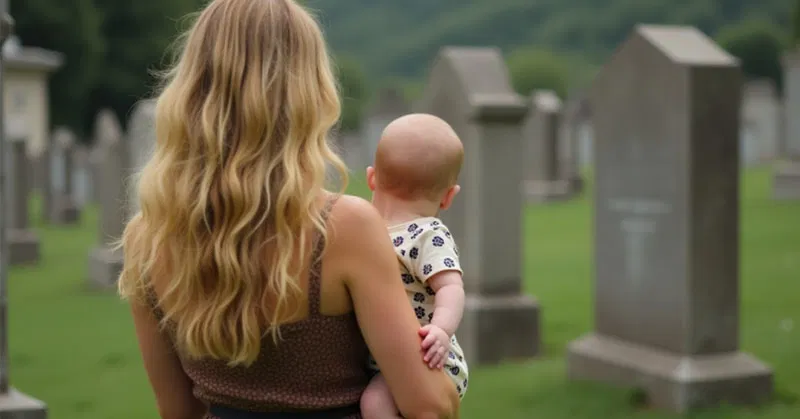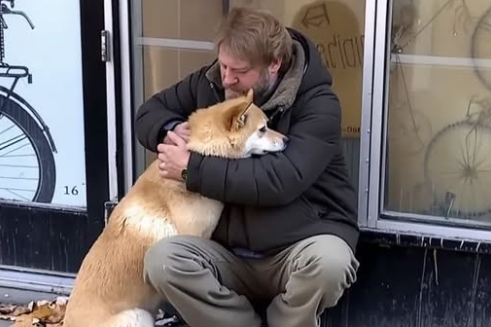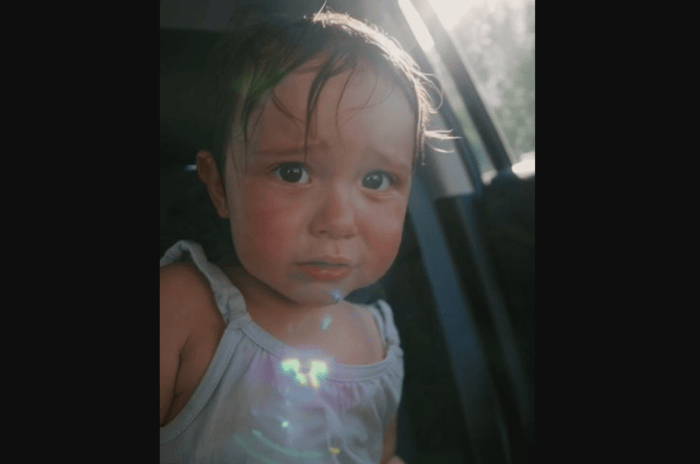Across the way, Mrs. Cartwright, my elderly neighbor, was in her yard. She was a petite woman, and possessed a kind smile. Even at sixty-seven, she had a certain vibrant energy, although I knew her health was notoriously touchy.
Today, she was relentlessly digging. Hard. Her frail arms repeatedly jabbed a spade into the unforgiving dirt, beads of sweat staining her blouse. It simply didn’t look right, not for her.
I quickly opened my window and called out, “Mrs. Cartwright! Are you okay?” She just kept at it, digging as if she didn’t even hear my voice. “Do you need help?” I tried again, my voice considerably louder this time.
Still no answer came from her.
Perhaps she was perfectly fine, I reasoned? I started to pull the window shut when she suddenly stopped, abruptly dropped the spade, and threw up her hands in exasperation.
“Finally!” she cried out, her voice a mix of relief and exhaustion. Then, like a puppet with its strings suddenly cut, she dramatically crumpled to the ground. “Mrs. Cartwright!” I bolted out the door, sprinting desperately to her yard. Her thin body lay sprawled motionlessly by the shallow hole, one hand resting precariously on its edge. I gently shook her shoulder, my touch light and cautious.
She didn’t move or stir. My heart pounded with terror when I checked her pulse. It was faint, but mercifully, it was there. Thank God. I leaned in closer, straining to hear her breath. It was slow and shallow, yet steady. A wave of profound relief washed over me.
“Okay, hang on,” I murmured softly, unsure if she could even hear my words. While carefully adjusting her head for better airflow, something distinct caught my eye. In the precise hole she’d been digging, something wooden subtly peeked through the loose dirt. A box?
I hesitated for a moment. Helping her was undeniably the immediate priority. But the box glinted faintly in the sunlight, pulling my focus like an irresistible magnet, drawing my gaze.
“What were you looking for?” I whispered, glancing anxiously between her still form and the enigmatic hole. My innate curiosity ultimately got the better of me. I reached into the dirt and tugged gently at the box. It came loose with surprising ease, as if waiting to be found.
The wood itself was weathered and aged but remarkably intact, and the lid creaked audibly as I cautiously lifted it. Inside were several bundles of yellowed letters tied with faded twine. Next to them lay more yellowed photographs and a single, sealed envelope.
“What…?” My voice trailed off into silence as I carefully pulled out one of the photographs. It showed a remarkably young Mrs. Cartwright, smiling radiantly beside a man in a military uniform. Her husband, perhaps?
I was stunned into momentary silence. The letters looked incredibly old, yet they were preserved remarkably well, a testament to their hidden significance. What kind of untold story was genuinely hidden here within these fragile artifacts?
When I had pieced through only a few of the contents, a faint, soft groan startled me, pulling me back to reality. “Mrs. Cartwright?” I asked, dropping the photograph gently onto the ground. Her eyelids fluttered open weakly, a sign of returning consciousness.
“Mm… where…?” Her voice was raspy, dry from exertion.
“You collapsed,” I said softly, kneeling closer to her. “Just stay perfectly still. I’ll call for help immediately.”
“No!” Her hand shot up with surprising speed, gripping my arm with unexpected strength. “The box. Is it—” She coughed weakly, struggling visibly to sit up, her body protesting.
“It’s here,” I said, pointing gently to its location. “But you truly need to rest, Mrs. Cartwright. Please.”
She completely ignored my plea, her eyes wide with a sudden urgency as she reached eagerly for the box. “Let me see it.”
I carefully passed it to her. She cradled it reverently like something utterly precious, her frail, trembling fingers gently brushing over the weathered wood.
“Sixty years,” she whispered, tears silently slipping down her deeply wrinkled cheeks, etching new paths.
“Sixty years?” I asked, genuinely confused by her statement.
“My husband,” she began, her voice trembling with emotion and memory. “He buried this before he went to war. Said it was… a way to keep his dreams safe, a hidden treasure. He told me to find it… if he didn’t come back to me.”
I blinked slowly, unable to form any words.
“He didn’t come back,” she continued, her voice filled with a deep, lingering sorrow. “And I looked, oh, how I looked for it. But I couldn’t find it anywhere. I thought it was truly gone forever, lost to time.” Her voice cracked with the weight of her remembrance.
“But I started dreaming about him again,” she said, her gaze distant and faraway, lost in the past. “He told me—‘Under the tree, my dove.’ That’s what he lovingly called me.” She laughed softly, a fragile sound, though tears continued to fall freely from her eyes. “I didn’t believe it at first, not truly. Just a dream, I thought. But something… something profound told me to dig, compelled me to search.”
“And you found it,” I said gently, confirming her triumph.
“Because of you,” she replied, meeting my gaze directly, her eyes filled with unspoken gratitude. “I couldn’t have done it alone, not truly.”
I didn’t know what words to offer in response.
“What’s in the letters, Mrs. Cartwright?” I finally asked, my curiosity piqued once more.
“Everything,” she whispered, her hands trembling with anticipation. “Everything he wanted to say but tragically couldn’t, before he left.”
She reached for the sealed envelope, her aged fingers delicately brushing over its unbroken seal.
“Help me open it,” she said, looking at me with eyes full of a profound, unspoken gratitude that warmed me.
She carefully pulled out a single letter, meticulously unfolding the fragile, yellowed paper. “Can I read it?” I asked gently, my voice hushed. She nodded, a slight tremor in her head, and handed it to me.
I cleared my throat softly and began to read aloud: “Dear Family, If you are reading this, it means my dove has found what I left behind for you. First, know that I loved you all deeply, even those I never had the chance to meet in this life. This world moves incredibly fast, and we often forget what truly matters most in the end. But love—love always endures, always stays. Take tender care of one another, always. Forgive, even when it feels impossibly hard to do so. And never, ever let time or distance turn you into strangers to each other. Inside this very envelope, I’ve left a small locket. Ruthie knows its profound meaning. Pass it down through the generations as a cherished reminder: no matter what trials life brings, hold on tightly to each other. Love is truly what lasts forever.
With all my heart, Your father and, I hope, grandfather.”
I lowered the letter slowly and looked over at Mrs. Cartwright. Tears streamed freely down her cheeks as she reached inside the now open envelope. Her trembling fingers gently pulled out a small, incredibly delicate locket. She opened it, revealing a tiny, faded photograph of her and her husband, both smiling brightly—captured in a perfect, timeless moment of youthful happiness. The locket shimmered faintly, catching the sunlight, a beacon of enduring love.
“He always said this would last longer than either of us,” she murmured, her voice thick with raw emotion and nostalgia. “And now, here it is, found at last.”
“It’s truly beautiful, Mrs. Cartwright,” I said quietly, genuinely touched.
She turned it over slowly in her hands, lost in profound thought and distant memories. “You should have it,” she suddenly declared, surprising me.
I looked up, startled by her offer. “What? No, Mrs. Cartwright, that’s… this truly belongs with your family, it’s their heritage.”
“You’re a part of this now,” she said firmly, her voice steady and resolute despite the deep emotion behind her words. “Robert believed everything happened at the precise right time, for the precise right reason. I think he’d genuinely want you to keep it, to cherish it.”
I hesitated for a long moment, but the profound truth in her eyes left absolutely no room for doubt or argument. Gently, I reached out and accepted the locket, surprised by the unexpected warmth it radiated in my palm. “I’ll take very good care of it, I promise you,” I vowed solemnly.
She gave me a small, heartfelt smile, a genuine expression of gratitude. “I know you will,” she replied, her voice soft with trust.
In the days that followed that extraordinary encounter, Mrs. Cartwright and I spent countless hours reading through the treasured letters together. Each one vividly revealed her husband’s unwavering love, his profound bravery during the war, and his enduring hope for their future.
“He wrote about everything, darling,” she told me one peaceful evening, her voice soft with remembrance. “How much he missed me terribly, his cherished dreams of triumphantly coming home… but mostly, he earnestly wanted our family to stay incredibly close, to remain united.”
I could clearly see how deeply those written words still resonated with her, still touched her very soul. “Have you thought about sharing them with your family, Mrs. Cartwright?” I asked gently, carefully.
She hesitated for a beat. “We’ve barely spoken in years, you know,” she confided, a trace of sadness in her voice. “After Robert died, we just… drifted apart. There were bitter fights. So many lingering regrets.”
“It doesn’t have to stay that way forever,” I said, offering a glimmer of hope. “Maybe these beautiful letters could genuinely bring everyone back together, could bridge the divide.”
She didn’t answer right away, but I distinctly saw the idea gently settle and take root in her compassionate heart.
Two weeks later, she bravely invited her estranged family for a significant gathering at her home. Given her delicate health, she clearly needed help with the preparations, and I gladly and eagerly offered mine without hesitation.
When the important day finally arrived, her living room felt incredibly warm and inviting, filled with a quiet anticipation. The letters were meticulously displayed on a table, arranged carefully alongside cherished family photos and, prominently, the locket.
Her children and grandchildren arrived slowly, one by one, exchanging awkward, tentative greetings, unsure of the reception. But as everyone gradually found their place in the room, Mrs. Cartwright courageously stood up, her fragile frame steady and resolute with newfound determination.
“These letters,” she began, her voice soft but surprisingly firm, commanding attention, “are from your grandfather. He wrote them during the war and buried them for us to find, a message from the past. They’re his enduring reminder of what truly matters in this life, a timeless wisdom.”
Her oldest son respectfully picked up a letter from the table and began to read it aloud. The room immediately fell silent, enveloped in a hush as raw emotions swelled among everyone present—tears quietly falling, soft laughter bubbling up, and moments of quiet, poignant reflection.
“I remember this story vividly,” one granddaughter said softly, holding up a faded photo for all to see. “Grandma told me all about this very day, so many times!”
Mrs. Cartwright’s face visibly lit up with pure joy as her family members began to reconnect meaningfully through the shared power of these rediscovered memories. The locket passed reverently from hand to hand, each person pausing thoughtfully to admire the tiny, precious photo held securely inside.
“Grandpa wanted us to keep this in the family, always,” she said, her voice filled with tenderness, as her youngest great-grandchild carefully examined the locket with curious eyes. “To remind us all to stay incredibly close, always.”
As the emotional evening drew to a close, no one seemed to be in a rush to leave the warmth of the room. The once-distant relatives stayed, talking and laughing genuinely like they’d never been apart, the old rifts mending. Mrs. Cartwright squeezed my hand tightly, her eyes shining brightly with unshed tears of happiness and gratitude.
“This, this wonderful moment, happened because of you, my dear,” she said softly, her voice filled with heartfelt appreciation.
“No,” I replied gently, shaking my head. “It was Robert. And it was ultimately you, Mrs. Cartwright.”
She smiled, a peaceful, contented smile, and I could clearly see how immensely much this evening meant to her heart.
Later, as I quietly walked home in the fading light, the locket rested warmly in my palm. It felt remarkably different now—not heavy with the weight of its history, but incredibly meaningful, imbued with purpose. A profound symbol of enduring love, and of a family beautifully brought back together, against all odds.
What had begun as just a regular day had transformed into something truly unforgettable and deeply resonant. I had learned a valuable lesson: that even the smallest act of kindness—helping someone in need, truly listening with an open heart—can utterly change everything for the better.
And as I looked back at Mrs. Cartwright’s house, now glowing with the lingering warmth of laughter and renewed connection, I knew with absolute certainty that her husband’s timeless message would live on forever—carried forward by the very ones he loved so deeply, continuing their legacy.




